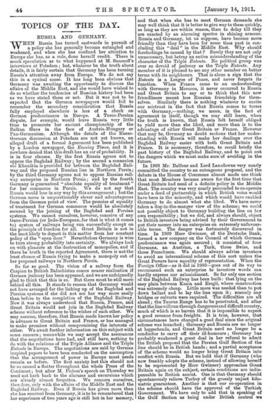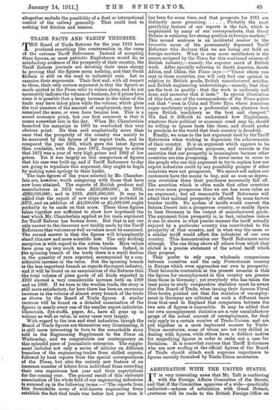TOPICS OF THE DAY.
RUSSIA AND GERMANY.
WHEN Russia has turned eastwards in pursuit of a policy she has generally become entangled and weakened, and when she has confined her attention to Europe she has, as a rule, done herself credit. There is much speculation as to what happened at M. Sazonoff's interviews at Potsdam ; but, whatever be the truth about details, it is fairly certain that Germany has been turning Russia's attention away from Europe. We do not say this in a cynical sense. It has long been obvious that Germany was awaiting the opportunity to discuss the affairs of the Middle East, and she would have wished to do so whether the tendencies of Russian history had been as we have stated them or not. But it was not to be expected that the German newspapers would fail to remember the secondary consideration that Russia fully employed elsewhere is less of a check on German predominance in Europe. A Turco-Persian dispute, for example, would leave Russia very little time to prosecute her ancient championship of the Balkan Slays in the face of Austria-Hungary or Pan-Germanism. Although the details of the Russo- German discussion at Potsdam are not yet known, an alleged draft of a formal Agreement has been published by a London newspaper, the Evening Times, and it is nowhere denied that this draft has an air of probability. It is in four clauses. By the first Russia agrees not to oppose the Baghdad Railway ; by the second a connexion vid Khanikin is provided for between the Baghdad Rail- way and the proposed Russian line in Northern Persia; by the third Germany agrees not to oppose Russian rail- way enterprise in Northern Persia ; and by the fourth Germany is guaranteed " absolute equality of treatment " for her commerce in Persia. We do not say that Russia would lose in any way by this arrangement ; but the German move is unquestionably clever and advantageous from the German point of view. The promise of equality of treatment for German commerce would be absolutely secured by the joining of the Baghdad and Persian systems. We cannot ourselves, however, conceive of any trans-Persian (or Indo-European, for that is what it comes to) system of railways being run successfully except on the principle of freedom for all. Great Britain is not in the least likely to depart in this matter from her constant policy of the " open door." Nevertheless Germany is wise to turn strong probability into certainty. We always look on with pleasure at the destruction of monopolies, and if there be truth in the reported Agreement, there is not the least chance of Russia trying to make a monopoly out of her proposed railways in Northern Persia.
So far so good. The vision of a railway from the Caspian to British Baluchistan comes nearer realisation if German jealousy has been appeased, and we are unfeignedly glad to think that this is so. But there must be still more behind all this. It stands to reason that Germany would not have arranged for the linking up of the Baghdad and Persian systems if she did not see her way more easily than before to the completion of the Baghdad Railway. Now it was always understood that Russia, France, and Great Britain would not join in the Baghdad Railway scheme without reference to the wishes of each other. We may assume, therefore, that Russia made lmown her policy in advance to Great Britain and France, or has managed to make promises without compromising the interests of either. We await further information on this subject with some concern ; meanwhile we may accept the assurances that the negotiations have had, and still have, nothing to do with the relations of the Triple Alliance and the Triple Entente in Europe. The negotiations are said by German inspired papers to have been conducted on the assumption that the arrangement of power in Europe must needs remain as before. The first anxiety lest this should not be so caused a flutter throughout the whole Press of the Continent; but after M. Pichon's speech on Thursday we need not hark back to the alarums and excursions which are already almost forgotten. We concern ourselves, therefore, only with the affairs of the Middle East and the Baghdad Railway. Even if Russia has given more than she has received from Germany, it is to bo remembered that her experience of two years ago is still hot in her memory, and that when she has to meet German demands she may well think that it is better to give way to them quickly, so long as they are within reason, than to delay till they are exacted by an alarming spectre in shining armour. Russia and Germany, let us suppose, have become more friendly than they have been for some time past in con- cluding this " deal " in the Middle East. Why should forebodings be caused by that ? Surely they are not only unnecessary, but betray an entire misunderstanding of the character of the Triple Entente. No political group was ever so devoid of jealousy as the Triple Entente. Any member of it is pleased to see any other member on better terms with its neighbours. That is alone a sign that the Entente is a League of Peace, and never forgets its function. When France came to an understandin with Germany in Morocco, it never occurred to Russia and Great Britain to say or to think that this new friendliness meant less Russian friendship for them- selves. Similarly there is nothing whatever to excite our mistrust in the fact that Russia comes to terms with Germany,—nothing, we mean, in the fact of agreement in itself, though we may still learn, when the truth is known, that Russia felt herself obliged to yield more than she liked, and more than is to the advantage of either Great Britain or France. However that may be, Germany no doubt reckons that her under- standing with Russia will make her dealings over the Baghdad Railway easier with both Great Britain and France. It is necessary, therefore, to recall briefly the past history of the Baghdad Railway, and to point out the dangers which we must make sure of avoiding in the future.
In 1903 Mr: Balfour and Lord Lansdowne very nearly committed the country to an outrageous proposal, and the debate in the House of Commons almost made one think that most Members became aware for the first time that Great Britain had need of a definite policy in the Middle East. The country was very nearly persuaded to co-operate under a deed of partnership in which British votes would have been in the minority, and which would have enabled Germany to do almost what she liked. We have never taken a dog-in-the-manger view of the scheme ; we could not possibly object to Germany building the line on her own responsibility ; but we did, and always should, object to British investors being advised by their Government to put their money into an enterprise on extremely unfavour- able terms. The danger was fortunately discovered in time. In 1909 Herr Gwinner, of the Deutsche Bank, formed a new company on the Council of which German predominance was again assured ; it consisted of four Germans, an Austrian, a Turk, three Swiss, and three Frenchmen. We should always advise investors to avoid an international scheme of this sort unless the Great Powers have equality of representation. When the Foreign Office—as it did in 1903—goes out of its way to recommend such an enterprise to investors words can hardly express our astonishment. So far only one section of the Baghdad Railway has been built : that lying on the easy plain between Sonia and Eregli, where construction was extremely cheap. Little more was needed than to put down ballast and to lay the line upon it ; scarcely any bridges or culverts were required. The difficulties are all ahead ; the Taurus Range has to be penetrated, and after that the line will run through dangerous and difficult country, much of which is so barren that it is impossible to expect a good revenue from freights. It is true, however, that circumstances have changed a good deal since the original scheme was launched ; Germany and Russia are no longer at loggerheads, and Great Britain need no longer be a conductor to carry off their ill-humours ; Germany has probably weakened a great deal in ber refusal to admit the British proposal that the Persian Gulf Section of the line should be in British hands ; and a partial acceptance of the scheme would no longer bring Great Britain into conflict with Russia. But we hold that if Germany (who now frankly adopts the scheme, instead of allowing herself to be represented by Herr Gwinner) approaches Great Britain again on the subject, certain conditions are indis- pensable to British assent. One is that Germany should spontaneously relieve Turkey of the grossly unjust kilo- metric guarantees. Another is that our co-operation in the scheme should have the approval of the Turkish Government. We have only to add that in speaking of the Gulf Section as being under British control we altogether exclude the possibility of a dual or international control of the railway generally. That could lead to nothing but friction and tension.







































 Previous page
Previous page